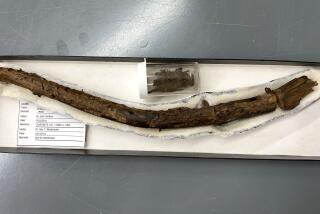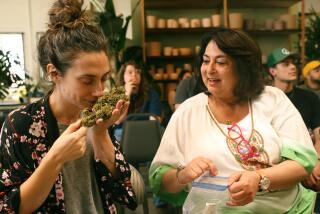Sowing Seeds on the Web
If you type “gardening” into a Web search engine, you’re going to get something like 1,349,623 matches, or hits.
Even when you narrow the field by including a word like “California,” you will turn up Web sites for Leonardo DiCaprio, for some reason, and an unbelievable number of other pages or sites.
Only a tiny, tiny fraction of these will have any relevance at all to a home gardener in California.
So much of the garden information on the World Wide Web simply doesn’t apply to California, or is downright misleading. Our climate is that distinctive.
Most search engines do have useful features that direct and narrow your search, such as AltaVista’s LookSmart, which zeros in on gardening subjects but still leaves you wondering whether the information applies here.
It helps, therefore, to know some of the most helpful sites. From there you can often travel, via the underlined links, to other useful California-oriented garden pages.
*
Some of the bigger sites have large lists of other Web sites to check out, often accompanied by reviews of the other sites.
Virtual Garden (https://www.vg.com) lists lots of other sites and if you type “California” into its search engine, you’ll get only those located in this state.
Sites such as Garden Escape (https://www.garden.com) have regional sections that attempt to deal with specific areas like ours, usually not very successfully.
Garden Escape, by the way, is a gardening supply supermarket-broker that works in partnership with other growers and suppliers, such as mail-order biggies like Gardener’s Supply, McClure & Zimmerman and High Country Gardens.
Not to be confused with garden.com is the Bay Area Gardener site, https://www.gardens.com, serving Northern California. This magazine-like site has columns and articles and great lists of nurseries and botanical gardens (useful for planning garden tours up north), as well as garden events. It also has a list of local garden Web addresses, such as https://www.nottonightdeer.com, a site for a new line of deer, squirrel and rabbit repellents.
San Diego has a similar site named Digitalseed (https://www.digitalseed.com). It has a calendar of garden events and a tremendous list of plant societies in the San Diego area. There are comprehensive lists of San Diego-area nurseries, including specialists in things like bromeliads or rare fruits.
There’s also an extra-easy-to-use chat area that works like a Q&A; column and a list of additional garden Web sites. On the list you’ll find https://www.ipm.ucdavis.edu, the site of the Integrated Pest Management Program at UC Davis. This is a very helpful site for Californians and contains several databases, including ones on garden pesticides and chemicals, plus information on garden pests, diseases and weeds. Garden chemical companies also have Web sites, such as Monterey’s, https://www.montereylawngarden.com.
*
Several local nurseries have Web sites, including Roger’s Garden in Newport Beach (https://www.rogersgardens.com) and Burkard Nurseries in Pasadena (https://www.burkards.com), which lists special plants it carries such as many kinds of magnolias and Japanese maples.
Wholesale nurseries may be the better sources of information. You normally can’t visit them or shop there, but on the Web you can access their sometimes illustrated, often illuminating catalogs.
For instance, San Marcos Growers (https://www.smgrowers.com) has an extensive list of unusual plants for California gardens, plus one of the best lists of deer-proof plants, a list of plants that will grow under eucalyptus and other garden tidbits.
Native Sons Nursery (https://www.nativeson.com) and Monterey Bay Nursery (https://www.montereybaynsy.com), two other avant-garde growers of Mediterranean-climate plants, also have sites with completely annotated catalogs that are very helpful.
In many cases, the online catalogs contain the only information available on plants too new to have made it into print literature. If you fall in love with a plant in one of these wholesale listings, however, you’ll have to order it through a local nursery.
There are California growers that do sell via mail order on the Net, such as the daylily growers (https://www.benrose.com) or Jim Dugan Flower Nursery in Encinitas (https://www.thebulbman.com). Dugan specializes in South African bulbs and has a complete bulb catalog on the Web, with photographs of nearly all the unusual bulbs he sells, many of which you will find pictured nowhere else.
The neat thing about the Web is that it’s just as easy to look at the offerings of a bulb grower in South Africa, with its very similar climate, as it is to find California growers.
For the fun of it, look at the great bulbs that appear in https://users.iafrica.com/c/ca/capeflor, the site of a South African nursery named Cape Flora, or the amazingly colorful callas at https://www.classicplants.co.za, another nursery.
Although I wouldn’t trade in my garden books quite yet, the Web does hold promise for California gardeners. This ability to look at similar Mediterranean garden climates--such as those of South Africa or Australia--seems especially promising since these climates are more like California than is the rest of our own country.
One intriguing site, https://www.support.net/medit-plants, recognizes this and hopes to contain and link a lot of the information that makes gardening in California so different.
In the Garden is published Thursdays. Write to Robert Smaus, SoCal Living, Los Angeles Times, Times Mirror Square, Los Angeles, CA 90053; fax to (213) 237-4712; or e-mail [email protected].






